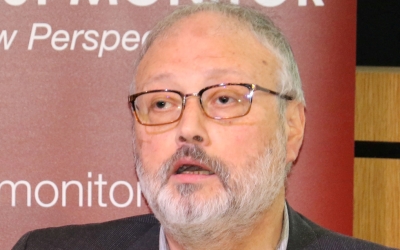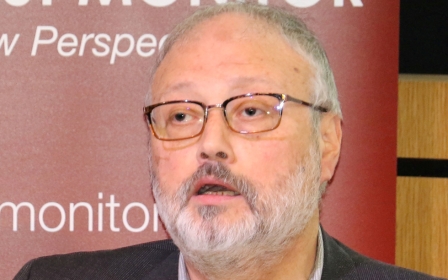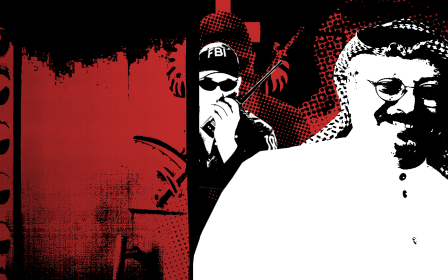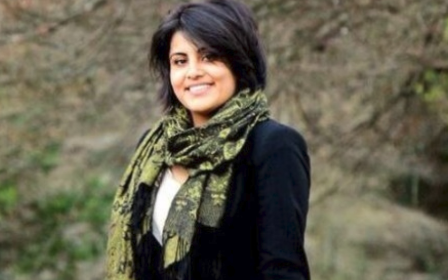Pence calls on Saudi Arabia to release imprisoned blogger Raif Badawi
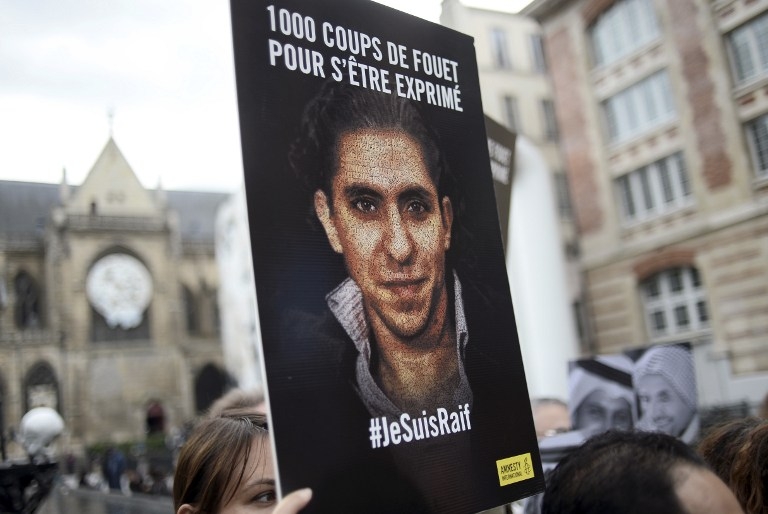
Mike Pence has called on Saudi Arabia to release imprisoned blogger Raif Badawi, in a rare critique of the Gulf kingdom's crackdown on dissent by a senior member of the Trump administration.
The US vice president, speaking at a religious freedom conference in Washington on Thursday, said the Saudi government should release Badawi.
Pence cited the Saudi blogger - who was arrested in 2012 and sentenced to 10 years in prison for insulting Islam in his online writings - among a handful of others he said have been detained for their religious views.
"In Saudi Arabia, blogger Raif Badawi is still in prison for the alleged crime of criticising Islam through electronic means," he told the crowd at the US State Department's Ministerial to Advance Religious Freedom.
His comments come after rights groups and activists, as well as American lawmakers, have urged the Trump administration to hold Saudi Arabia accountable for the murder of journalist Jamal Khashoggi in October.
New MEE newsletter: Jerusalem Dispatch
Sign up to get the latest insights and analysis on Israel-Palestine, alongside Turkey Unpacked and other MEE newsletters
Despite that uptick in pressure, however, President Donald Trump has pledged to remain a steadfast ally of Saudi Arabia and its powerful crown prince, Mohammad bin Salman, who stands accused of ordering the journalist's assassination.
On Thursday, Pence mentioned Badawi's case alongside that of a 90-year-old Orthodox Church patriarch detained in Eritrea, as well as the imprisonment of Mauritanian blogger Mohamed Ould Cheikh Ould Mkhaitir and lecturer Junair Hafeez in Pakistan.
"All four of these men have stood in defence of religious liberty - the exercise of their faith, despite unimaginable pressure. And the American people stand with them," the vice president said.
"So today the United States of America calls upon the governments of Eritrea, Mauritania, Pakistan and Saudi Arabia to respect the rights of conscience of these men and let these men go."
Pence's comments are a rare display of criticism of Saudi Arabia, which has for years been accused of cracking down on dissenting voices and imprisoning rights activists, among many others.
Riyadh has been under increased international pressure to account for its rights abuses after Saudi government agents murdered Khashoggi inside the country's Istanbul consulate on 2 October.
But despite the outrage over the brazen killing - which the CIA has said bin Salman ordered - Trump has stood by his Saudi allies.
"We may never know all of the facts surrounding the murder of Mr Jamal Khashoggi. In any case, our relationship is with the Kingdom of Saudi Arabia," the US president said in a statement shortly after the killing.
The Saudi government also faces continued pressure to release Badawi, the creator of the blog "Free Saudi Liberals".
'All four of these men have stood in defence of religious liberty - the exercise of their faith, despite unimaginable pressure'
- US Vice President Mike Pence
After his arrest seven years ago, Badawi was sentenced to 10 years in prison, a fine, and 1,000 public lashes, which were set to be doled out every week in tranches of 50.
He was publicly flogged once - in January 2015 - prompting a global outcry.
"For years, the Saudi Arabian authorities have conducted a relentless campaign of repression in the name of security," says Amnesty International, which has spearheaded a campaign for Badawi's release.
"The authorities have cracked down on peaceful activists calling for reforms and on demonstrators protesting against human rights violations. Those who express dissent face arrest and imprisonment whether they are critics, bloggers, activists or academics," the rights group says.
"Raif Badawi is just one of many."
Riyadh carried out a mass execution of 37 prisoners in late April, many of whom were Saudi Shia activists convicted in trials rights groups have described as unfair, with confessions extracted under torture.
Middle East Eye delivers independent and unrivalled coverage and analysis of the Middle East, North Africa and beyond. To learn more about republishing this content and the associated fees, please fill out this form. More about MEE can be found here.


